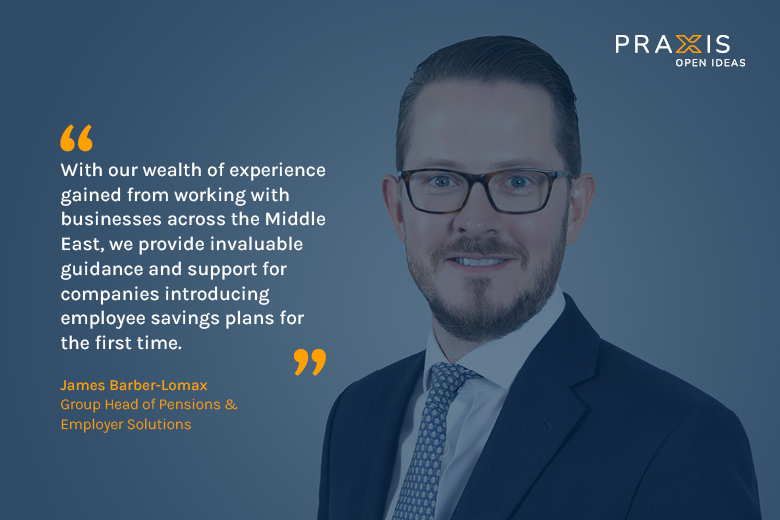
Employee savings plans in the GCC region: benefits to employees and employers
In the last year, interest in employee savings plans among companies in the Gulf Cooperation Council (GCC) region has surged, demonstrating the growing commitment to enhancing financial security and employee welfare.
The GCC, which includes Bahrain, Kuwait, Oman, Qatar, Saudi Arabia, along with the United Arab Emirates (UAE), is taking proactive steps through the introduction and promotion of these savings plans to ensure a more financially secure future for its workforce.
Recent developments in employee benefits
The UAE recently introduced alternative end of service (EoS) gratuity rules, prompting many firms to consider introducing employee savings plans as an additional voluntary employee benefit within a wider employee benefit package. While some firms offer the benefit to their entire workforce, others choose to introduce it for selected staff based on criteria such as career stage, salary level or high performance.
Benefits to employees
Different from EoS benefit plans, these initiatives are gaining traction as both employees and employers recognise the multifaceted benefits they offer. Employee savings plans provide a structured way for employees to save money, helping to plan for a more secure financial future, particularly in a region with less established social security systems compared to some Western countries. These plans, also known as workplace savings plans, can be fully or partially funded by the employer, and the regular contributions encourage a savings discipline for participating employees.
As life expectancy increases, planning for retirement is becoming more crucial, and savings plans help employees accumulate funds for retirement, reducing dependence on family or state support. Moreover, these plans act as a safety net for handling unforeseen expenses without falling into debt, such as medical emergencies, job loss or rent increases. Plan members can make elections on how accrued benefits are distributed upon their death, and it is not necessarily mandated to follow Sharia principles.
With the investment management provided by quality asset management firms, savings plans offer competitive interest rates or investment opportunities that can yield higher returns compared to traditional savings accounts, especially as bank interest rates start to decline amongst global interest rate fluctuations.
Benefits to employers
In terms of benefits to employers, offering savings plans can make them more attractive to potential hires and improve retention rates by making employees feel more valued and secure in their financial futures. Financially secure employees are generally less stressed and more focused at work, which can lead to increased productivity and higher levels of job satisfaction.
Companies providing robust employee benefits are often viewed more favourably and can enhance brand loyalty and attract better business opportunities. Additionally, implementing employee savings plans can demonstrate a company's commitment to good governance and international best practices, which is increasingly important for multinational firms operating in the GCC.
Challenges in implementation
Despite the clear benefits, there are challenges to businesses implementing employee savings plans in the GCC region:
- Regulatory framework
Each country in the GCC and often, individual freezones or emirates, has its own regulatory landscape, which can complicate the implementation of standardised savings plans across the region. At Praxis, we have extensive expertise and experience dealing with local and international regulations governing the establishment and ongoing treatment of these plans. - Cultural factors
Saving habits, abilities and attitudes towards long-term financial planning can vary significantly among the diverse expatriate and local populations. With our wealth of experience gained from working with businesses across the Middle East, we provide invaluable guidance and support for companies introducing employee savings plans for the first time. - Employer readiness
Not all employers may have the administrative capability to manage savings plans effectively. Praxis can deliver a fully managed employee savings solution where we provide the full trustee, administration, and technology services from our UAE offices. Some other providers either engage overseas firms to undertake some or part of these roles - while other solutions can involve multiple companies that do part of the solution each, which can lead to inefficiencies and increased costs.
Conclusion
Employee savings plans are a win-win proposition for both employees and employers in the GCC region. They not only promote financial stability and security for employees but also enhance organisational loyalty, productivity, and reputation for employers.
As the GCC continues to evolve economically and socially, the adoption of comprehensive savings plans will be crucial in fostering a financially resilient workforce and a thriving business environment.
Please note that this article is intended to provide a general overview of the matters to which it relates. It is not intended as professional advice and should not be relied upon as such. Any engagement in respect of our professional services is subject to our standard terms and conditions of business and the provision of all necessary due diligence. Praxis does not provide financial advice. Investments may go down as well as up, and past performance is no guarantee of future results. PraxisIFM Trust Limited is regulated by the FSRA in the ADGM. © Praxis 2023
Find out more about our Employer Solutions

